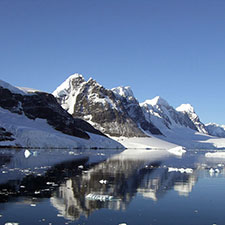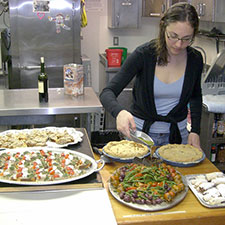Love and Loss on the Ice
By Matt Windsor
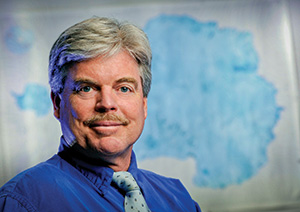 Polar researcher Jim McClintock offers a firsthand look at climate change in his new book, Lost Antarctica.In his new book, Lost Antarctica, polar biologist Jim McClintock, Ph.D., offers plenty of reasons to be concerned about the fate of the frozen continent: a few trillion, at least.
Polar researcher Jim McClintock offers a firsthand look at climate change in his new book, Lost Antarctica.In his new book, Lost Antarctica, polar biologist Jim McClintock, Ph.D., offers plenty of reasons to be concerned about the fate of the frozen continent: a few trillion, at least.
That’s the approximate number of sea butterflies currently floating in the chilly waters of the Southern Ocean. The tiny, shelled creatures serve as the base for an intricate food chain that extends upward to the mighty blue whale. Hundreds of species depend on the sea butterfly, but it is under assault on a massive scale. Rising levels of atmospheric carbon dioxide, transferred to the polar oceans by complex climate effects and simple chemistry, are making the sea butterfly’s home waters more acidic.
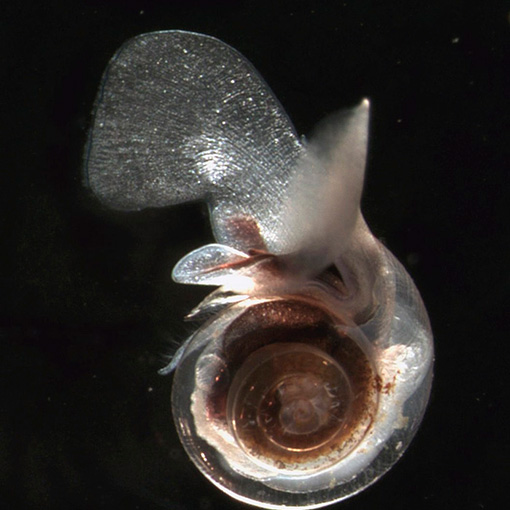 Trillions of sea butterflies float through the waters around Antarctica. Ocean acidification threatens the animals' shells—which could spell disaster for an entire ecosystem. (Photo courtesy Jim McClintock)When the pH reaches a critical point, it will dissolve the animals’ protective shells—killing them and risking the collapse of an entire ecosystem. Acid seas are the “other CO2 problem,” McClintock says—one that, unlike the problem of CO2 emissions in the atmosphere, has received little media attention.
Trillions of sea butterflies float through the waters around Antarctica. Ocean acidification threatens the animals' shells—which could spell disaster for an entire ecosystem. (Photo courtesy Jim McClintock)When the pH reaches a critical point, it will dissolve the animals’ protective shells—killing them and risking the collapse of an entire ecosystem. Acid seas are the “other CO2 problem,” McClintock says—one that, unlike the problem of CO2 emissions in the atmosphere, has received little media attention.
Lost Antarctica offers a host of other reasons why we need to sweat the seemingly small stuff now occurring in this icy world. Combining the latest scientific data with personal observations from two decades of Antarctic research, McClintock lays bare the intricate inner workings of his beloved continent. In Antarctica, he explains, everything from microscopic phytoplankton to state-sized ice shelves is interconnected—and under threat.
(Story continues beneath the video)
UAB Magazine: Your book describes many worrying changes in Antarctica. Which is the most apparent when you visit?
McClintock: The most obvious to me are the changes in the ice, especially in the Antarctic Peninsula [the section of the continent closest to South America]. The annual sea ice along the peninsula has receded about 40 percent in the last 30 years. And that has had a major effect on a community that surrounds Palmer Station. There has been a large colony of Adelie penguins on Torgersen Island for 700 years, but in the last 30, it has dwindled rapidly. In the book, I call it a “ghost rookery.” The Adelies use the sea ice to reach their feeding grounds. But as the ice has shrunk, they have had to swim farther and farther to reach those grounds. These animals are living right on the edge of their energy budgets anyway, and they can’t make it. Then there’s the warming of the air, which makes it more humid and increases snowfall. The Adelies are genetically programmed to show up on Torgersen at the same time every year, but now they are often caught up in unseasonably late snowstorms while nesting their eggs. And when the snow melts, the eggs drown.
UAB Magazine: After 20 trips to Antarctica, what keeps you coming back?
McClintock: Several things. Antarctica’s natural beauty is just breathtaking. You look off in the distance and think you can reach out and touch a mountain range, and it’s actually hundreds of miles away. Also, Antarctica is one of the most fabulous places on our planet to study marine biology. When you dive under the ice, the seafloor is covered with life—just as much as you would find in the Great Barrier Reef in Australia. There are so many intriguing scientific questions about the marine life and how it’s adapted to such a unique environment. I feel very lucky to get to work there.
UAB Magazine: Considering you named your book Lost Antarctica, do you have any hope that the continent can be saved?
McClintock: We haven’t yet lost the continent, but its marine life is genuinely being threatened. There is hope that remediations that will reduce the production of greenhouse gases will slow down what is happening. But the dramatic changes being witnessed are a wake-up call. I’m not saying we need to give up our cars tomorrow. But we do need to start thinking rationally about where we can make accommodations in energy conservation.
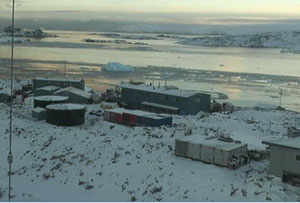 |
| Watch a live webcam of activity at Palmer Station—and follow UAB's Antarctica research team on their blog. |
In December I got the chance to lead a group on a philanthropic “Climate Change Challenge” expedition cruise for Abercrombie and Kent to Antarctica. With All Seasons Travel here in Birmingham handling the cruise bookings and in my role as a professor of Polar and Marine Biology at UAB, I took a group of 16 from Birmingham, which makes 100 people from this city that I’ve been able to take down there over the past six years. Many of them are business leaders and other very influential people in our community. It’s life-impacting. They come back and are ambassadors for Antarctica.
UAB Magazine: Do you ever see yourself retiring from Antarctic expeditions?
McClintock: Once you’ve been, getting back to Antarctica becomes a vocation in and of itself. I don’t see this amazing continent leaving my horizon until I physically can’t go. It’s a love affair, really, and I’m not ready to give it up.
James McClintock is the UAB Endowed University Professor of Polar and Marine Biology. You can purchase a copy of Lost Antarctica at any bookstore or online. The book’s website is www.lostantarctica.com.
Take FiveMcClintock on what he couldn’t live without on a polar expedition. I’ve got it down to five “C”s. First is communication. When I was a graduate student on my first trip in 1982, all we had were Western Union telegrams. And at $3 a word, I couldn’t say much. Now I have an Internet-connected phone in my office and another beside my bed. To be able to talk to my wife and family whenever I need to is a wonderful thing.
Camaraderie is vital. You’ve left your family behind, so you need that sense of connection to others. And I’ve always experienced a wonderful camaraderie, not only within my research station “family” but in many other settings. A ship pulls in from Argentina or Chile, and you get to share a glass of wine with the crew and talk about your work. The same thing occurs when you visit another country’s station. It transcends gender and age, too. Warm clothing, of course, is another must. Despite climate warming, you still need to wear a jacket when you go outside! Several layers, in fact.
When a ship arrives, everyone drops what they’re doing and goes down to the “freshies line.” We lift boxes of avocados, grapefruit, etc., and pass them from person to person until they’re safely in the kitchen. When I worked at McMurdo Station in the 1980s and ’90s, we’d have periods with no freshies. I remember a sign over the lettuce, which had been grown in a greenhouse at the station, saying that each person was entitled to one leaf. Thankfully, that’s no longer the case.
|
